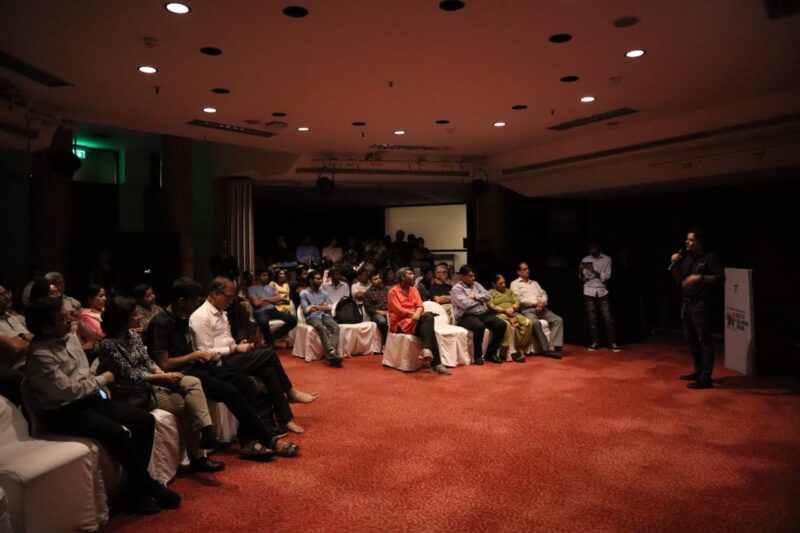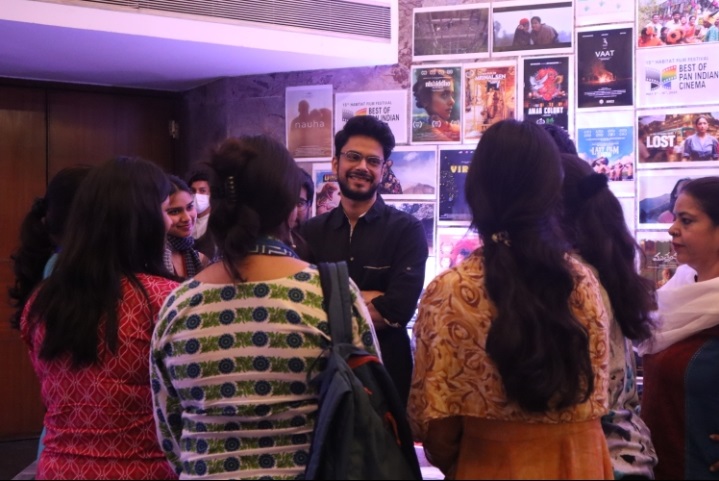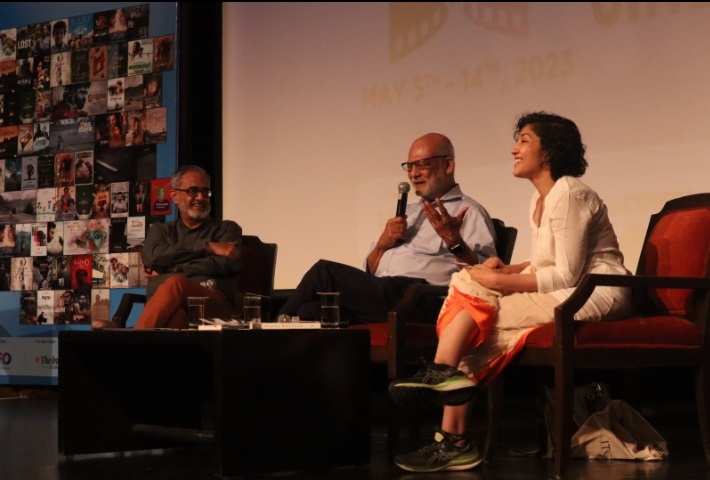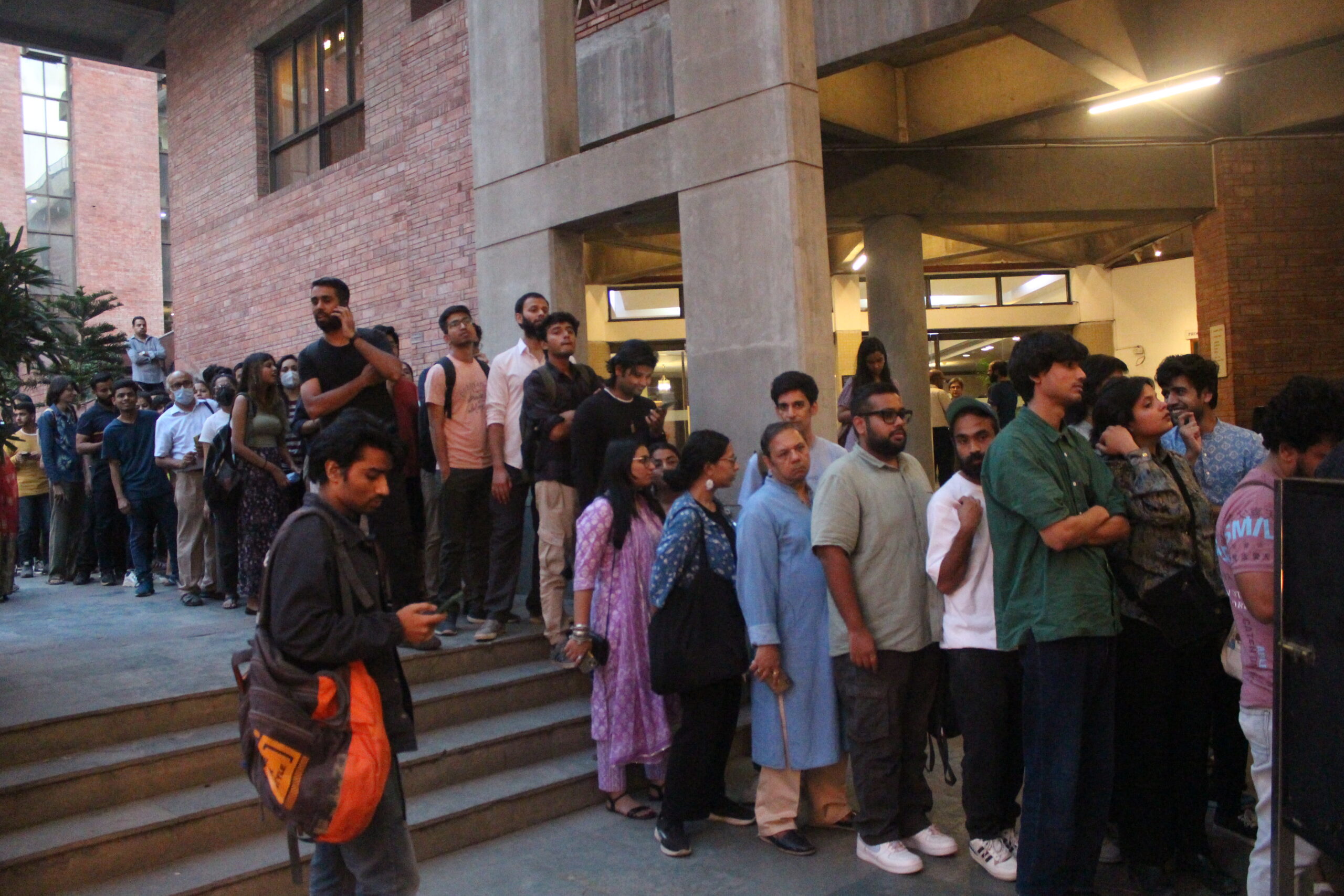Celebrating the centenary of Mrinal Sen, one of the most prominent Indian filmmakers, this years’ Habitat Film Festival screened a small retrospective of his work. Films like Khandhar, Ek Din Achanak, and Ek Din Pratidin were screened to immerse the audience into the cinematic tradition of pan-India.
Contemporary of Satyajit Ray and Ritwik Ghatak, Sen belongs to that tradition of filmmaking that brings out the poetic in the political, narrating the ordinary lives of post-Partition Bengal.
“Festivals like this always feel so special because one gets to watch movies that we may not see [on screen] otherwise. OTT platforms these days are giving audiences good exposure to independent cinema. But sometimes, I just want to watch the old masters and this is where these festivals come into the picture. Watching Sen on the big screen is like a dream come true for many of us,” says Niharika Gupta, a visitor at the festival during the screening of Khandhar.
The festival was an emotional ride. Narratives with evocative stories of love and friendship, of separation and loneliness, of rebellion and acceptance, across generations and generation gaps, found space outside the bubble of formulaic cinema. This made the screenings special, followed by conversations that were not just limited to cinema, but human existence at large.
The power of cinema not just as a form of entertainment, but also as a means to create dialogue in society, could be realised during the screening of Jaggi on May 7. Many men in the audience spoke about their experience of sexual abuse after the screening. Jaggi, directed by Anmol Sidhu, follows the life of a schoolboy as it explores male abuse and homophobia.
In the same breath, the movie Pokhur Ke Dunu Paar (On either side of the pond), a debut by Parth Saurabh, was thronged by people in large numbers. The movie explores the life of eloped couples Sumit and Priyanka, who return to their hometown from Delhi during the Coronavirus pandemic. What follows is a series of long arguments between the couples as they fail to fulfil each other’s emotional needs.

Parth is delighted by the love he received from the audience. “I had an amazing time screening Pokhar Ke Dunu Paar at the Festival. To screen the film in a packed Stein Auditorium was a pleasure and I have been quite delighted by the response the film has been getting since then. I think it is screenings like these that make you believe that the audience for independent cinema does exist. It has definitely added to my conviction for the film and for my belief that I am not lost in my attempts of creating something new,” he said.
Tushar Chaudhary, a Delhiite who had specifically come to the festival to watch the film, said, “The film has some scenes that are so grounded around the lives of small-town people. It validates experiences that are otherwise ignored. No need to mention the visual language of the film. It’s pensive and thought-provoking. It was both a visual and intellectual treat.”
The festival included about 60 features, documentaries, and short films in 17 languages, showcasing the best of contemporary Indian cinema. The emphasis was given to regional cinema with films in Malayalam, Kannada, Tamil, Telugu, Bengali, Assamese, Maithili, Odia, Hindi, English, Gujarati, Marathi, Punjabi, Sanskrit, Ladakhi, Meiteilon and, for the first time, Kumaoni on the line.
Amartya Bhattacharya’s Adieu Godard, a story about a man trying to organise a Jean-Luc Godard film festival in their small village in Odisha, was loved by the audience.
Speaking about the regional cinema, Bhattacharya said, “Cinema is a language in itself and what we refer to as Hindi cinema or Tamil cinema are only the languages of dialogues. If dialogues and dialects are aligned to where characters are rooted in, that would make cinema much more authentic. I feel that it’s probably the authenticity that viewers love the most, sometimes consciously, sometimes subconsciously. I think that’s the key to loving films of other languages – the sheer authenticity.

“As for comprehensive viewing, we do have subtitles and that makes every film equally universal. I think it’s high time that Indian viewers overcome the 1.5-inch barrier of subtitles, and then every cinema in the world will be ours. I’m glad that we are seeing that happen nowadays. I appreciate festival organisers who select films going beyond linguistic biases. Slowly and gradually, this will build a much inclusive culture, and break all linguistic biases and hegemony.”
At the festival, certain films got their Delhi and national debuts. The national premiers included the Malayalam film Meghdoot/The Cloud Messenger, a contemporary narrative of reincarnation about two lovers meeting in the present day after centuries of longing, directed by Rahat Mahajan, and two Bengali films: Sujit Kumar Pyne’s Meghbari, a story about two lovebirds and their journey of love, marriage, and divorce set against the backdrop of a mountain resort they hoped to call home someday, and Aritra Sen’s Ghore Pherar Gaan/The Homecoming Song, about the protagonist’s complicated relationship within her married life, a new relationship, and what she chooses.
“Habitat Film Festival has been a wonderful event. An event curated for pan Indian cinema where the best of Indian cinema assembled and provided a wholesome and unique experience for the cinema lovers. Such events hold cultural significance as they promote art with full honesty without any form of sugar-coating in terms of projection and treatment,” says filmmaker Farooq Jamal during the screening of Shaunak Sen’s documentary All That Breathes.
Delhi premieres included Tora’s Husband, an Assamese film by award-winning filmmaker Rima Das, Gautham Ramachandran’s Tamil film Gargi, and Arivu Mattu Guruvu/The Word and The Teacher, a multilingual film by Prashant Pandit.

There were discussions around Mrinal Sen by his son, Kunal Sen, film critic Sohini Chattopadhyay and Naveen Kishore, publisher of Mrinal Sen’s “Absence Trilogy”.
There was the launch of the book When Ardh Satya Met Himmatwala: The Many Lives of 1980s Bombay Cinema by Avijit Ghosh, which tells the fascinating story of perhaps the most eventful, disruptive and transformative decade of Hindi cinema (1980s).
The festival also paid tribute to Satish Kaushik, Pradeep Sarkar, and Uttara Baokar, who we lost in recent times.




